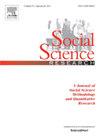Inequality and the eroding base of liberal democracy
IF 3.2
2区 社会学
Q1 SOCIOLOGY
引用次数: 0
Abstract
Previous studies broadly agree that economic inequality is negatively associated with popular support for democracy. This paper tackles this belief, testing it with more informative hypotheses. Capturing the insight from the theories of democratic attitudes and learning, this paper posits that increasing inequality would have differential effects on citizens’ normative support for democracy and their authoritarian inclination, and that those effects would also differ across the democratic regimes. Analyzing World Values Survey data covering 41 democracies over up to 25 years (1995–2020), this paper finds very little evidence for the association between inequality and normative support for democracy, whereas unearthing strong evidence for a varying effect of inequality on authoritarian inclination across the democratic regimes. It turns out where inequality is more severe, citizens in liberal democracies are more attracted to authoritarian leaders, whereas those in electoral democracies are less so. My findings refine the predominant thesis on the negative relationship between inequality and democratic support, detecting the complexities underlying it. My findings also shed new light on the theory of democratic learning and socialization by revealing the potential role of democratic regimes that remained unexplored in prior study. Lastly, this study provides a concrete explanation for how authoritarian leaders could win growing popular support in recent years where liberal democracy had most flourished.
不平等与自由民主基础的削弱
以往的研究普遍认为,经济不平等与民众对民主的支持呈负相关。本文针对这一观点,提出了更具参考价值的假设进行检验。本文从民主态度和学习理论出发,假设不平等的加剧会对公民对民主的规范性支持和专制倾向产生不同的影响,而且这些影响在不同的民主制度下也会有所不同。通过分析世界价值观调查(World Values Survey)涵盖的 41 个民主国家长达 25 年(1995-2020 年)的数据,本文发现几乎没有证据表明不平等与对民主的规范性支持之间存在关联,但却发现了强有力的证据,表明在不同的民主制度下,不平等对专制倾向的影响各不相同。事实证明,在不平等现象更为严重的地方,自由民主国家的公民更受独裁领导人的青睐,而选举民主国家的公民则不那么受青睐。我的研究结果完善了关于不平等与民主支持之间负相关关系的主要论点,发现了其背后的复杂性。我的研究结果还揭示了民主制度的潜在作用,从而为民主学习和社会化理论提供了新的启示。最后,本研究提供了一个具体的解释,说明在自由民主最兴盛的地方,近年来独裁领导人为何能赢得越来越多的民众支持。
本文章由计算机程序翻译,如有差异,请以英文原文为准。
求助全文
约1分钟内获得全文
求助全文
来源期刊

Social Science Research
SOCIOLOGY-
CiteScore
4.30
自引率
4.00%
发文量
0
审稿时长
65 days
期刊介绍:
Social Science Research publishes papers devoted to quantitative social science research and methodology. The journal features articles that illustrate the use of quantitative methods in the empirical solution of substantive problems, and emphasizes those concerned with issues or methods that cut across traditional disciplinary lines. Special attention is given to methods that have been used by only one particular social science discipline, but that may have application to a broader range of areas.
 求助内容:
求助内容: 应助结果提醒方式:
应助结果提醒方式:


